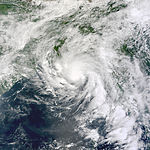2012 North Indian Ocean cyclone season
| 2012 North Indian Ocean cyclone season | |
|---|---|

Season summary map
|
|
| Seasonal boundaries | |
| First system formed | October 10, 2012 |
| Last system dissipated | December 24, 2012 |
| Strongest storm | |
| Name | Nilam |
| • Maximum winds | 85 km/h (50 mph) |
| • Lowest pressure | 987 hPa (mbar) |
| Seasonal statistics | |
| Depressions | 5 |
| Deep depressions | 5 |
| Cyclonic storms | 2 |
| Total fatalities | 128 total |
| Total damage | At least $56.7 million (2012 USD) |
| Related articles | |
| Deep depression (IMD) | |
| Duration | October 10 – October 11 |
|---|---|
| Peak intensity | 55 km/h (35 mph) (3-min) 1002 hPa (mbar) |
| Cyclonic storm (IMD) | |
| Tropical storm (SSHWS) | |
| Duration | October 22 – October 26 |
|---|---|
| Peak intensity | 75 km/h (45 mph) (3-min) 998 hPa (mbar) |
| Cyclonic storm (IMD) | |
| Tropical storm (SSHWS) | |
| Duration | October 28 – November 1 |
|---|---|
| Peak intensity | 85 km/h (50 mph) (3-min) 987 hPa (mbar) |
| Deep depression (IMD) | |
| Tropical storm (SSHWS) | |
| Duration | November 17 – November 19 |
|---|---|
| Peak intensity | 55 km/h (35 mph) (3-min) 1002 hPa (mbar) |
| Deep depression (IMD) | |
| Tropical storm (SSHWS) | |
| Duration | December 22 – December 24 |
|---|---|
| Peak intensity | 55 km/h (35 mph) (3-min) 1002 hPa (mbar) |
The 2012 North Indian Ocean cyclone season was an event in the annual cycle of tropical cyclone formation. The season had a late start, with the first system forming by October, towards the end of the year. During the season, only five systems formed, of which two of them became named cyclonic storms. Both the storms made landfalls, and they, along with the deep depressions were responsible for 128 deaths and economic losses worth at least $56.7 million (2012 USD). The scope of this article is limited to the Indian Ocean in the Northern Hemisphere, east of the Horn of Africa and west of the Malay Peninsula. There are two main seas in the North Indian Ocean — the Arabian Sea to the west of the Indian subcontinent, abbreviated ARB by the India Meteorological Department (IMD); and the Bay of Bengal to the east, abbreviated BOB by the IMD. The official Regional Specialized Meteorological Centre in this basin is the India Meteorological Department (IMD), while the Joint Typhoon Warning Center releases unofficial advisories.
The first depression of the season developed out of the remnants of Severe Tropical Storm Gaemi on October 10, 2012, very late into the 2012 cyclone season, about 350 km (215 mi) southeast of Kolkata, West Bengal. and brought high winds and heavy rains to much of Bangladesh, causing extensive damage. The storm killed a total of 30 people. On October 23, the second depression of the season developed out of a persistent low in the Arabian Sea and soon became the first cyclonic storm of the season Murjan. Only two days later, the third depression of the season formed in southern Bay of Bengal and gradually strengthened into Cyclonic Storm Nilam. The cyclone made landfall over Southern India early on October 31 and dissipated on November 2.
...
Wikipedia










